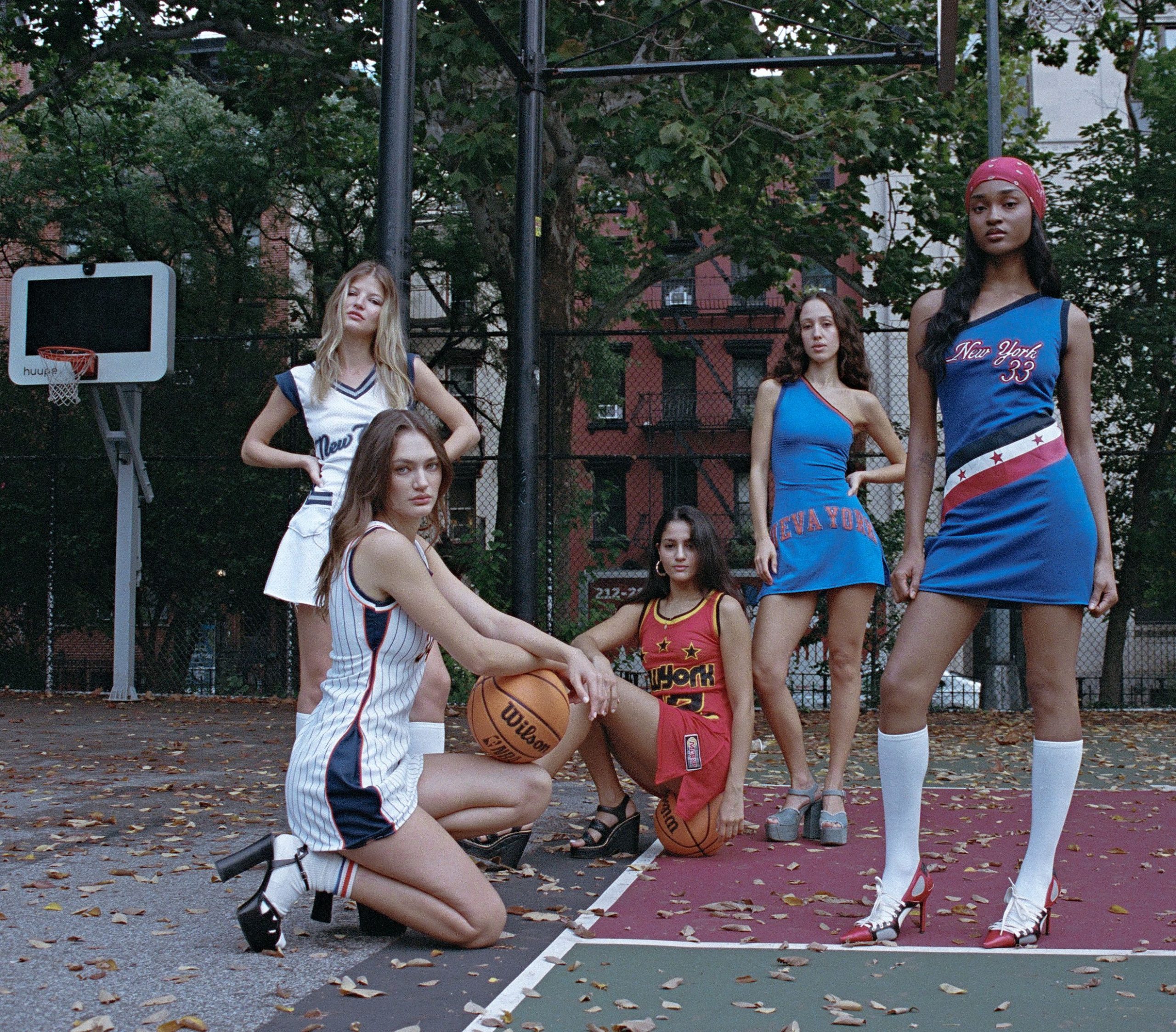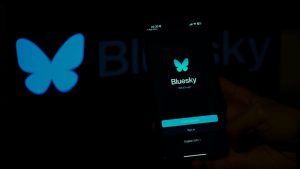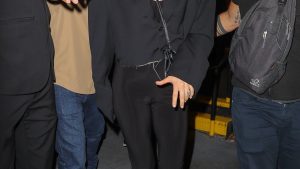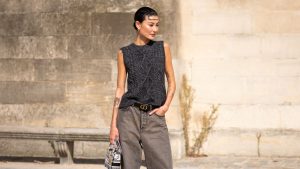
With Coco Cultr, a New Era of the Jersey Dress Emerges
As a kid growing up in Seattle, Coco Cultr founder Jesa Chiro remembers thinking that as a little sister, “your older brother just seems like the coolest person in the world,” she says. “At least to me, anyway.” Her older brother, Munya, who she describes as a “basketball fanatic,” collected everything basketball-related he could: jerseys, NBA 2K games, bobbleheads, and whatever memorabilia he could get his hands on. Some of Chiro’s earliest memories include waking up early to go to Munya’s basketball camps, watching games together, and tagging along on trips to Goodwill with him in search of jerseys. The Chiro family’s team was the Seattle SuperSonics until it was sold in 2006, later moving to Oklahoma City and rebranding as the Thunder in 2008.
Coco Cultr founder Jesa Chiro as child, in Seattle with her basketball-enthused father and brother.
Photo: Courtesy Jesa Chiro
Chiro with her WNBA Seattle Storm merch.
Photo: Courtesy of Jesa Chiro
While Chiro never had the innate athletic ability or handles for basketball, she did go through a brief obsessed-with-Lauren-Jackson-and-Sue-Bird phase. (Her brother had the Sonics, she had the Seattle Storm.) After receiving a wristband from Bird at age 11, she claims, “I never washed it.” Years later, she’d find her place in the sport not by way of her brother or as a WNBA fan, but through fashion.
“Why is there not any cute sportswear for women?” asks Chiro, who sits on a patio over Zoom. While that question might seem outdated in light of countless collaborations, capsule collections, and brands like Playa Society reshaping WNBA merch, Chiro called out the gap early on. When the Sonics left her hometown, the cultural and emotional pull of sports memorabilia was palpable, inspiring her to stockpile and rework jerseys. Chiro also cites Xuly.Bët’s spring 1995 collaboration with Puma—which saw deadstock soccer jerseys reimagined as dresses—as an early Coco Cultr influence. “In an interview, [Xuly.Bët designer] Lamine Badian Kouyaté said, ‘Why not use something that would go to waste and make something new and beautiful?’ That really stuck with me. It captures how I approach Coco.”
Photo: Sophie Hur
Chiro founded Coco Cultr during the height of pandemic lockdown, while studying at Western Washington University. After graduation she moved to New York, and came across the aforementioned Xuly.Bët fashion show on YouTube one day. Inspired, Chiro went to L Train Vintage near her apartment and picked up an old Philadelphia 76ers Hardwood Classics jersey. “I didn’t know what I was going to make,” she says. “I just started cutting and sewing, no pattern, no plan.” At the time, Chiro was working retail at Lower East Side vintage store Procell. She wore her custom mini jersey dress, with the word “Sixers” across the front, to her shift the next day. Her boss clocked it immediately: “That’s really sick,” he said. “Do you have more? We should be carrying this.” And they did, becoming the first store to place an order with the brand; Procell still carries Coco Cultr today.
The sustainable label made a name for itself online with upcycled, reworked vintage pieces: two-piece sets, bikinis, and, most notably, the vintage jersey dresses. Think: A-line cut, body-conscious fit, mid-thigh hem dresses with a heavy emphasis on NBA team logos. The rarer the jersey, the more excited Chiro is to work with it. Her signature silhouette has caught the attention of the sports and streetwear industries—from celebrity stylists and WNBA teams that have gifted her jerseys to reimagine, to brands like Nike and Supreme that have tapped her for special projects.
Photo: Liv Solomon
Chiro calls herself a “digger” when it comes to seeking out vintage jerseys. “It’s fun for me to dive into what makes something rare,” she says. “What was happening at the time? Why this colorway? That’s the part I love.” These days, though, with high demand, she has rules: no Michael Jordan Bulls jerseys (too common) and deadstock Ray Allen Sonics jerseys are a priority, as are any of Kobe Bryant’s.
“I try to find jerseys that are actually in good condition, which is hard,” she says. “And I especially love the weird ones: bootlegs, or basketball jerseys that aren’t even from real teams.” One of her best-sellers? A pink-and-silver “New York” jersey she cut into a two-piece. It wasn’t licensed, but that didn’t matter; it sold out as soon as she put it on her site.
Photo: Liv Solomon
Today, Chiro can’t rely on thrift stores the way she used to. Her orders and collections require hyper-specific pieces. Instead, she takes multiple trips to different vendors, swap meets, flea markets, and doomscrolls online, of course. But with flea market trips and collector meetups also comes a bit of anxiety, all in the name of transparency. “With one of the vendors, I was buying all of these sick, pristine, and rare Sonic jerseys, but I had to say, ‘I might be cutting them and I want to let you know that,’” she says. To Chiro’s surprise, he responded, “That’s so sick, you’re giving these jerseys a new life and I love that.”
Like the sports world itself, memorabilia collecting remains largely male-dominated, something Chiro understood going in. “I think the sportswear world, basketball world, and streetwear world is male-dominated,” she says, “but it feels like right now there’s a push to try to get more women into the spaces.”
Photo: Sophie Hur
A self-proclaimed “girly-girl,” Chiro is drawn to the tension between sports and style—what athletes are wearing, how they’re wearing it, and who designed it. She’s especially drawn to feminine silhouettes, which, save for the Y2K-era jersey dresses and side-tie tanks, have been largely missing from the basketball merch world. “There were so many jerseys for men, and the ones available for women felt like they were not feminine,” she says. “I want to take something from a man’s world and make it totally feminine. I want to carve out a space for me and my people to be in this world.” With her short A-line dresses, marked by double front pockets—and sometimes asymmetrical necklines—she’s doing just that. Long term, she envisions a bigger play: partnering with a WNBA team or an arena to sell her reworked jerseys during games.
Photo: Liv Solomon
While one-of-one orders are the foundation of Coco Cultr—“it’s fun to create [them] for the customer because [they’re] special to each person, like little art pieces,” Chiro says—they’re increasingly challenging to fulfill. Case in point: Angel Reese’s team recently reached out, asking if Chiro could turn a custom jersey dress around in a day. “I was like, ‘I don’t even have the jersey yet!,’” she says.
Alongside Reese, Chiro dreams of seeing Rihanna in one of her dresses. These are women who, to her, embody what she calls the “Coco girl.”
“A Coco girl is someone who creates her own world, and leads in her own life,” she says. “I think of anyone who’s true to themselves, and does what they want to do, that’s a Coco girl.”











